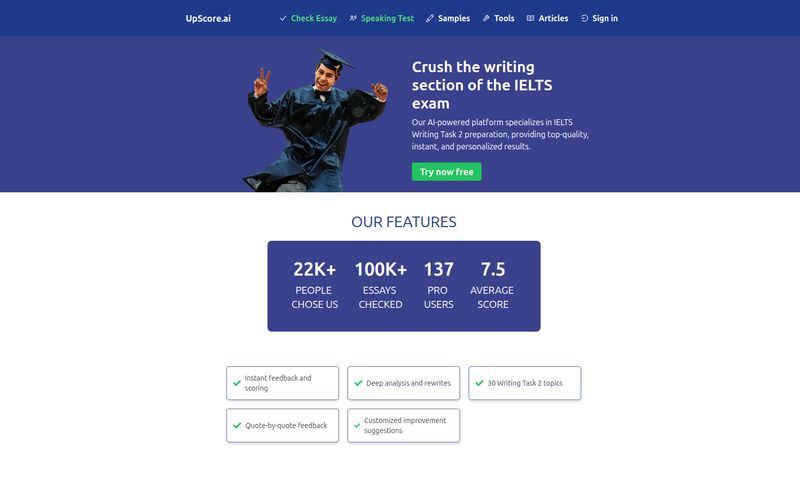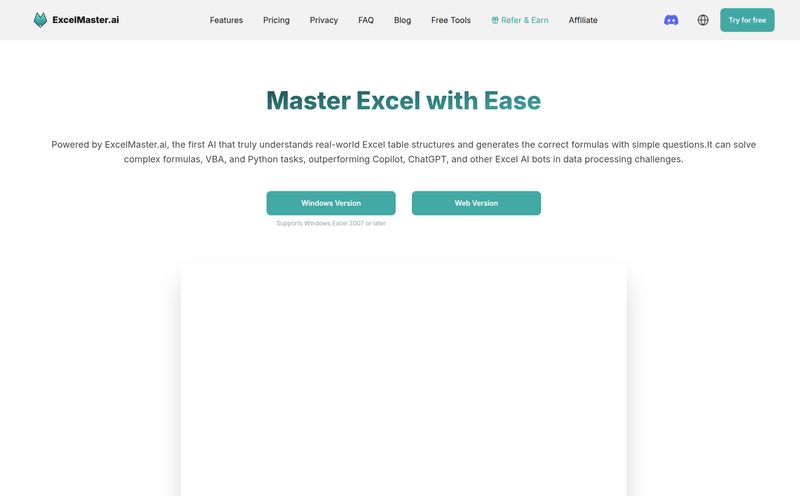The daily grind for anyone in the digital space—whether you're an SEO, a student, a marketer, or a content creator—involves a ridiculous amount of research. It's a never-ending cycle of opening tabs. So. Many. Tabs. You start by looking up one simple stat, and an hour later you're 27 tabs deep, reading about the history of the spork, with no memory of how you got there. We've all been there.
The dream has always been to have a smarter way to sift through the digital noise. Something that doesn't just give you a list of links, but actually understands what you're asking. Well, a new player named iFlow has stepped into the ring, and it's making some pretty bold promises about getting you into that elusive "flow state" of productivity. You know the one—where the work just... works. But does it deliver? I decided to take a look.

Visit iFlow
So, What Is iFlow, Exactly?
At its heart, iFlow is an AI-powered search and knowledge management tool. Think of it less like a traditional search engine and more like a research assistant that lives in your browser. Its whole mission is to help you find, understand, and use information more efficiently. Instead of you having to piece together information from ten different sources, iFlow aims to do the heavy lifting, connecting the dots so you can focus on the bigger picture. It’s designed for anyone who feels like they’re drowning in information, from academics wrestling with dense papers to creatives looking for that next big idea.
The Core Features That Make It Tick
Okay, let's get into the good stuff. What does this thing actually do? I’ve found it really boils down to four key areas.
The Intelligent Search: More Than Just Keywords
We’ve been trained for decades to think in keywords. We chop our complex questions down into little phrases and feed them to Google. iFlow tries to break that habit. It's built on a more semantic search model, meaning it focuses on the intent behind your question. You can ask it complex things like, "What are the long-term psychological effects of remote work on employee creativity?" and instead of just a list of articles that contain those words, it attempts to synthesize an answer. It feels more like a conversation. It's not perfect, but it's a refreshing change from the old way of doing things.
Knowledge-Based Q&A: Your Personal Oracle
This is where it gets really interesting for me. The Q&A feature can pull answers from a huge range of sources, from casual blog posts to heavy-duty academic journals. Need a quick summary of a historical event for a piece you're writing? Done. Need the core arguments from a specific scientific paper without reading all 30 pages? It can do that too. This is an absolute game-changer for initial research, helping you quickly determine if a source is worth a deeper read. It’s like having a university librarian on call, but without the late fees.
Smart Reading: Taming the Information Beast
This might be my favorite part. We all have that folder of bookmarked articles we swear we're going to read. The Smart Reading feature in iFlow is the cure for that digital hoarding. You can feed it a long article, a dense report, or a webpage, and it will pull out the key takeaways, summarize the main points, and basically give you the TL;DR version. For anyone on a tight deadline, this feature alone could be worth its weight in gold. It helps you digest massive amounts of text in a fraction of the time, making you feel ridiculously productive.
A Spark of Creative Assistance
I was skeptical about this one. A search tool for creativity? Sounds a bit like an oxymoron. But it’s surprisingly helpful. By pulling together information from different fields and sources, it can help you spot patterns and connections you might have missed. You can use it as a brainstorming partner, asking it to generate ideas around a topic or to provide different angles on a story. It won’t write the article for you (and you shouldn't want it to!), but it can definitely help break through a creative block when you're staring at a blinking cursor.
Let’s Talk About the Not-So-Perfect Bits
No tool is perfect, and it’s important to go in with eyes wide open. Based on my tinkering and what I've seen, there are a couple of things to keep in mind.
First, there are some murmurs about browser compatibility. It might not play perfectly with every single browser out there, especially less common ones. I didn't run into major issues on Chrome, but it’s something to be aware of if you're a die-hard Firefox or Brave user. Also, its availability might be limited by region. So, depending on where you are in the world, you might not be able to access it just yet. A classic new-tech-rollout problem, really.
What's the Damage? A Look at iFlow's Pricing
This is the million-dollar question, isn't it? As of my writing this, there's no clear pricing page. Zilch. Nada. This can be interpreted in two ways. The optimistic view is that it's currently free to use while it's in a growth phase, which is awesome. The more cautious take is that a pricing model is coming, and we just don't know what it will look like. My advice? Get in now and use it for free while you can. Worst case, you get a feel for it and can decide if it's worth paying for later.
Final Thoughts: Is iFlow Worth Your Time?
So, what's the verdict? In my opinion, yes, iFlow is absolutely worth a try. It’s a genuinely interesting step forward in how we interact with information online. It’s not going to replace human critical thinking—and it shouldn't—but it can act as a powerful catalyst for it.
It’s a tool that can clear away the underbrush of information overload, leaving you with a clearer path to that coveted flow state. It streamlines the most tedious parts of research and ideation, giving you back time and mental energy to pour into the work that actually matters. It has its quirks and a few unknowns, but the potential here is pretty exciting. Give it a spin, you might be surprised at how much smoother your workflow becomes.
Frequently Asked Questions about iFlow
- How is iFlow different from Google or other search engines?
- The main difference is in the output. Google gives you a list of links and resources that you have to sift through yourself. iFlow aims to understand the intent of your question and synthesize a direct answer, summarizing information from multiple sources and acting more like a research assistant.
- Is iFlow completely free to use?
- Currently, there is no public pricing information, which suggests it's free to use for now. However, like many new tech platforms, this could change in the future as the tool develops and new features are added.
- What kind of creative tasks can iFlow help with?
- It's great for brainstorming and ideation. You can use it to find unique angles for a topic, generate content outlines, discover related concepts you hadn't considered, or simply get a fresh perspective to break through writer's block.
- Can iFlow replace my other research tools completely?
- Probably not completely, at least not yet. It's a fantastic tool for initial research, summarizing, and ideation. However, for deep, specialized academic research or fact-checking primary sources, you'll still want to use dedicated academic databases and go directly to the source material. Think of it as a powerful addition to your toolkit, not a total replacement.
- Is my data safe when using iFlow?
- Like with any AI tool, it's wise to be cautious. You should review their privacy policy (if available) to understand how your data is handled. As a general rule, avoid inputting sensitive personal or proprietary information into any third-party AI platform.
- Do I need to install any software to use iFlow?
- From what's apparent, iFlow operates as a web-based tool or potentially a browser extension. This means you likely won't need to download and install a heavy piece of software, making it easily accessible from any compatible browser.
References and Sources
- Flow | Psychology Today - For more on the concept of 'flow state'.
- A Guide to Semantic Search | Search Engine Land - A good primer on the technology behind tools like iFlow.



